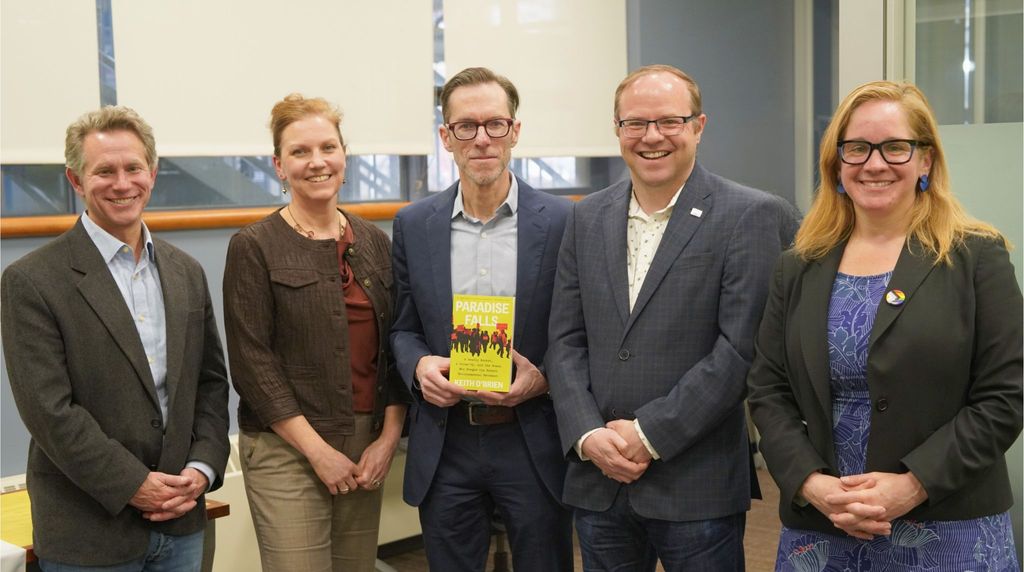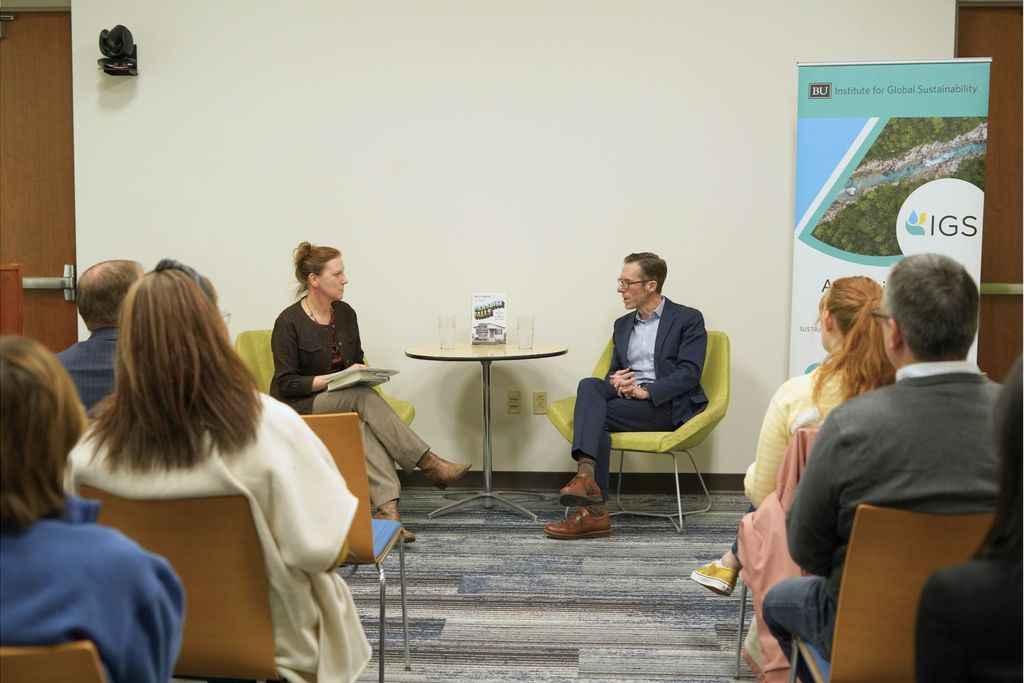Keith O’Brien’s book Paradise Falls spotlights the women of Love Canal, who faced a toxic waste crisis in their own homes – and fought for change.
By Hannah Connell (IGS Communications Assistant, Spring 2025)
Keith O’Brien’s book Paradise Falls opens with a hard-to-believe true scene. On a warm day in May 1972, children at a playground in the LaSalle neighborhood of Niagara Falls were drawing with what they thought was sidewalk chalk. The material turned out to be solid chemical waste, sending a young girl to the hospital with burning eyes. Unbeknownst to local residents, the playground and school were built on top of an old dumping site for toxic chemical waste that was making them sick. This vivid vignette exemplifies O’Brien’s approach to human-centered storytelling.
On April 10, in the first of IGS’s newly-launched author talk series, Boston University students, faculty, staff, and others from the IGS community gathered to hear O’Brien, a New York Times bestselling author and award-winning journalist, speak about Paradise Falls. The book tells the true story of the mothers who led a two-year fight to escape their homes amid one of the worst environmental crises of the 20th century. The Love Canal disaster led to significant changes in environmental regulations, including the establishment of the Superfund program to clean up hazardous waste sites in the United States.
During the event, O’Brien discussed the crisis, his inspiration for the book, insights into his writing and reporting process, and the story’s relevance today.

Capturing “The Human Story” Behind the Crisis
What happened at Love Canal, O’Brien said, “had never been written about the right way. In my opinion, I think all too often with environmental storytelling in particular, we can get lost in the weeds and the science and the numbers and the chemicals, and get distracted from what is the important story – which is the human story.”
Throughout his talk at IGS, O’Brien shared anecdotes illustrating the human impact of the 1970s disaster. One notable story involved Lois Gibbs, a mother who became a prominent activist after her child began experiencing seizures from chemical exposure at the local school. O’Brien recounted how Gibbs, alongside other families, organized to demand accountability from both the government and Hooker Chemical, the corporation that had buried the chemicals decades earlier.
O’Brien said with their “outspokenness and their willingness to put themselves on the line again and again and again, willingness to be arrested, willingness to go to jail, they show people across America…this isn’t an East Coast-West Coast issue. This issue of the environment is an every person issue, and they really make it something more tangible for everybody.”
The stories of Luella Kenny, whose young son died from kidney complications amid the crisis, and Beverly Paigen, a scientist who put her career and reputation on the line to join the fight, are also prominently featured in the book, which centers the resilience of the mothers who ardently advocated for their community in the face of a public health and environmental crisis.
IGS Affiliates from COM, SPH, Offer Opening Remarks, Moderation
Kicking off the event was former Boston Globe journalist, BU College of Communication professor of the practice in journalism, and IGS affiliated faculty David Abel. He always assigns Paradise Falls to his environmental journalism students. In his opening remarks, Abel described the book as a powerful story of how community members, scientists, public officials, and reporters worked together “to make things better, to right wrongs, and to somehow collectively eek out some measure of justice. Ultimately, this is a story about the dawn of the environmental movement.”
O’Brien was joined in conversation by moderator Stephanie Ettinger de Cuba, BU School of Public Health research associate professor and executive director of Children’s HealthWatch at Boston Medical Center, who is also affiliated faculty with IGS. Her work focuses on how public policies can affect the health of young children and families.
Paradise Falls shows how “much more can be done when we’re really in deep partnership with communities,” Ettinger de Cuba said.


A Story With Lessons for Today
The conversation concluded with a Q&A session, where attendees asked about the local media coverage at the time, O’Brien’s research process, and how he built such detailed scenes from an event that occurred nearly five decades ago.
When discussing how individuals can make a difference today in large-scale global issues like climate change, O’Brien noted that in the case of Love Canal, activists were persistent in their efforts because the threat was immediate and located under their own houses.
“I think what we need to communicate as science writers, as storytellers, as public policy workers, as doctors – is that the threat is beneath our house,” O’Brien said. “If you are willing to put yourself on the line again and again and again, change can come. But it absolutely will take that kind of sacrifice, probably from all of us.”
The event was hosted by IGS and co-sponsored by the College of Communication with its new Center on Media Innovation for Social Impact and the Initiative on Cities. Promotional partners included the Center for Innovation in Social Science, the School of Public Health’s Department of Environmental Health, and the Women’s, Gender, and Sexuality Studies (WGS) Program.
Watch the Recording
